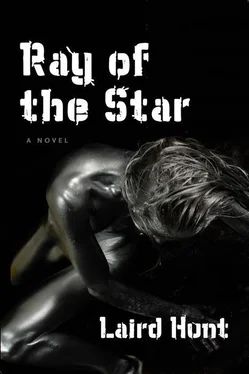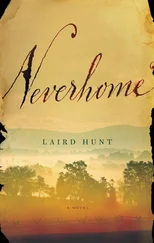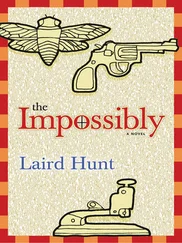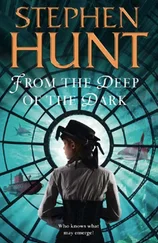Laird Hunt
Ray of the Star

Now you must learn how to last.
Then one day the deadly ones did appear.
They stood in a smoking row and told Harry what they were going to do and Harry rose, trembling, and said that he would go, that they could take him, could please take him instead, but they just smiled, wisps of smoke escaping their already blood-soaked lips, then vanished, and Harry screamed and ran for the door, even though he was 500 miles from home and snow lay deep over the countryside and the world was a dead thing under the stars, so that later, as he stood in dark wool nodding at people who placed their hands on his arm and looked at him out of puffed eyes, he wondered why they weren’t looking at him through ice, why ice didn’t fall from their eyes and cover the floor and coat the walls, and end all warmth, and that later still it seemed to him that all warmth had ended and that the world around him had shrunk to the size of his fist and that the fist would never open again, upon which his wounded mind saw a fist bloom into a beautiful hand, and, with a crushed sob, he began to creep out of the sorry thing his life had become, but this was only after years had passed.
Leave, Harry thought so he locked the front door, threw the keys into the snarled forsythia, got into his car and drove past houses he had long ago stopped looking at and did not look at now, and knew he would never look at again, and then they were behind him and the country beside the highway opened up, when there weren’t any subdivisions or industrial parks, onto cow-peppered grassland above which hawks circled and balloons hung heavily and gliders scraped away at the sky, an endless, hopeless affair the color of a postcard he had been sent, unsigned, some years earlier from a great city where he had once spent a few happy months, some kind of blue with a few drops of bloody red in it, which called to mind a drink he had once had but couldn’t remember the composition of as he had sat in a bar in that great city and smashed himself to smithereens for no compelling reason, the way he had done many things in that particular part of his deep past, when he had worked hardly at all and slept a great deal and very little had mattered, much like, he thought as he took the exit for the airport, now, this moment, these last years, although the situations were not the same, oh no, even if very little now mattered and very little had mattered then there had been those intervening years when everything had mattered and that changed it, irrevocably, and as he walked away from his car, he thought again of the great city and that shade of blue, which had surely shifted over the years he had kept the postcard — part of a collection which even now, as he set his credit card down on the counter and said the name of the great city, was sitting, continuing to shift, in an Adidas box beside his desk in the house that years ago had stopped being his home.
On the plane that carried him over the Atlantic he sat next to a young woman with short hair the precise color, she informed him, of crushed pomegranate flesh, who was reading a coffee-table sized book called, Exquisite Corpse: Surrealism and the Black Dahlia Murder, which presented the argument, through neutral text and heavily inflected images, that the murderer in the famous unsolved case of Elizabeth Short was an amateur artist and physician named George Hodel, who was known to be a friend to and admirer of various surrealist artists, and it was certainly true, as the young woman explained to him over airline chicken, pasta, and peas, that the authors of the study made a credible case for their hypothesis, in part through the skillful juxtaposition of macabre crime scene photographs of the “black dahlia”—cut in half lying in high grass; cut in half lying on the autopsy table — with multiple famous surrealist canvases by Dali, De Chirico, Man Ray, etc. that showed women in various states of vivisection, all of which Harry found compelling and strangely moving, but not nearly as compelling and strangely moving as he found the young woman explaining all of this to him — this young woman with her deucedly bright hair and rather fat face and crooked teeth and pleasant voice and long earrings from the end of which dangled miniature blue skulls — and he said to himself, I hope she doesn’t stop talking, but of course in time the stewards and stewardesses came and took away their massacred trays, and the young woman stowed her book and brought out a pair of headphones, and Harry, left alone with himself, began to fear that he would have one of his episodes and would have to go and lock himself in the bathroom, but instead he grew sleepy and stared at his hands and, legs twitching, eventually dozed, his head lolling ever-so-slightly from side to side, and every now and then he would wake and wipe his mouth and look over at the young woman and hope she would bring out the book again and talk to him, but she didn’t, and, unable to come up with anything that felt even vaguely like a conversation starter, he was left to fill the long hours with empty thoughts, until, as he stood in line to use the restroom toward the end of the flight, a leather-faced man wearing a lapel pin with a fish motif about Harry’s age embroiled him in a conversation about golf and an exciting new golf ball that was being released that very month, onto the central stem of which conversation Harry, for his part, pasted one or two remarks about Restless Leg Syndrome, from which he had suffered, increasingly, for years, as well as a new method for rendering certain objects invisible that was being elaborated in some cutting-edge laboratory somewhere, which conversation seemed to Harry to form an interesting echo of his earlier interaction about surrealism and the Black Dahlia, not least because almost from the moment the man had begun speaking to him about the issue of Golf Digest he was holding in his hands, he, Harry, had half-imagined that he was speaking to the Dahlia’s presumptive murderer, George Hodel, which was why — hoping to draw him out and remembering something the young woman had said earlier about Hodel feeling “in his twitchiness,” either untouchable or unseeable or both — he had interjected the comments about Restless Leg Syndrome and invisibility, but the man had more or less ignored Harry and had gone on about golf and then had stepped into a free restroom and had vanished by the time Harry came back out of his own cramped cubicle.
Upon returning to his seat, Harry, whose intention had been to begin gathering his things — the unpromising copy of the New Yorker he had brought to read but hadn’t opened, the half a Snickers bar he had stuffed between its pages an hour into the flight, the packet of salt and pepper crackers he had saved from his meal — instead leaned his head back, pushed the aluminum seat recline button, shut his eyes and found himself thinking, with startling immediacy, of footage he had seen on television the week before of a brilliant green tree frog with prodigiously spatulate toes and huge, heavy-lidded eyes negotiating the undulating upper canopy of an unnamed rainforest that stretched, like the surface of some improbable off-world ocean, in all directions as far as the camera could reveal, which gave way to a succession of treetop close-ups, first of what had looked to Harry like a cross between a caterpillar and a piece of delicate, white coral, then an enormous lizard that put him in mind, even though he knew he was dealing in gross approximations, of a Komodo dragon, then of an unmoving insect,
Читать дальше













